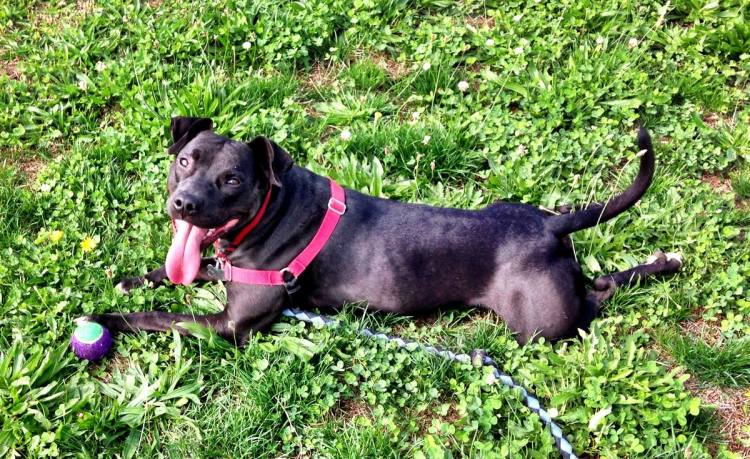Several weeks ago, I glibly asked if you’d clone your dog. Because who wouldn’t want to have a second and third and fourth lifetime with their bestest friend?
I was surprised how many commenters said they’d never do it. In my fantasy, scientists could mix up a little cocktail of Isis DNA in a petri dish and boom, another baby Isis is born. I had not thought about the number of laboratory dogs involved in the process. First, an egg must be harvested from a dog, and then a surrogate dog must carry the embryo. Hundreds of dogs have been experimented on, and hundreds of mutant puppies born and killed in the quest to bring dead pets back to life. It’s a gruesome business, and sure, maybe acceptable if the end goal is curing cancer, but not for our amusement.
In Dog, Inc.: The Uncanny Inside Story of Cloning Man’s Best Friend, John Woestendiek writes:
That dog cloning would go commercial is exactly what animal welfare groups feared most. It would mean more animals being used for their eggs and as surrogates, more capitalizing on the grief of pet owners. And in a world already overpopulated with dogs — where millions a year are put down in America alone — coming up with a new way to create them, factory style, seemed disingenuous, if not irresponsible.
Woestendiek makes a point, but overall, I found his narrative tiresome. He follows the stories of the cloning pioneers, spending more time on the politics and peculiar life histories of the players than what actually happens to the animals, perhaps because that information is not available.
How many trials and errors and eggs and surrogates it took to produce Missy’s clone isn’t known. With the work being conducted at a private institute in Korea, that data remained secret…
Another issue is that the people who could afford to pay for their dogs to be cloned are complete weirdos.
I’d said I would pay any amount to have Isis back … for science (and a book deal). Again, this is a fantasy where no dogs are harmed in the making of another Isis. My book would be about how alike or dissimilar the Isis clone baby was to the original, based on my having learned from all the mistakes I made the first time around.
Now that I know the cost to other dogs, I don’t want to tell that story anymore.
Maybe as science fiction…
Instead of spending time and money on cloning, let’s find homes for dogs in shelters, like Gibson here! He’s available at the Humane Society of Skagit Valley, and he loves to play!
 The Tuesday’s Tails blog hop is hosted by Dogs N Pawz and Talking Dogs, featuring shelter pets. Find a pet at your local animal shelter or rescue and join in!
The Tuesday’s Tails blog hop is hosted by Dogs N Pawz and Talking Dogs, featuring shelter pets. Find a pet at your local animal shelter or rescue and join in!
Powered by Linky Tools
Click here to enter your link and view this Linky Tools list…

Gibson is a handsome guy! Sharing.
Very interesting information about cloning. But I like you plan, let’s help Gibson get adopted first.
I also wrote about cloning over on my blog. I personally wouldn’t do it simply because its unnatural. Naively I didn’t think about all the dogs harmed and used during the process. This affirms my stand on the subject further.
Thanks for elaborating on the topic.
Yay! You read the book! I didn’t know how much was involved in cloning, either, until I read Dogs Inc.
Thanks for the recommendation!
I never thought about cloning seriously, but I know I would never do it anyhow. I’d rather have a whole new dog to enjoy. And it would be a rescuer’s nightmare! I’ll be sharing Gibson, he looks like a lot of fun!
Very interesting! And Gibson is gorgeous too!!
Shared!]
ღ husky hugz ღ frum our pack at Love is being owned by a husky!
Ohhhh. If you haven’t listened to This American Life’s story about a man who cloned a beloved pet, you should. I think the episode is called Reunited and It Feels So Good.
That man and his Brahman bull are featured in Dog, Inc.!
I used to joke that I wanted to clone my heartdog Lucy… until I read Dog, Inc. Then my joke wasn’t funny at all. Living creatures are so much more than dna. Sharing Gibson and hope he finds a forever home soon.
When I first heard about cloning, I thought “oh, that would be awesome.” (I had no idea about the gruesome science behind it that you write about!) But then when I really thought about it – I knew that was something I’d never do, no matter if money was no object. Abby was gorgeous (and so was our angel Bailey) but it was their personalities that we REALLY loved. And to have another dog that looked the same, but *wasn’t* the same… it just doesn’t seem right. That Dog Inc book doesn’t sound like the book for me…
I haven’t read the book, Dog, Inc., nor have I ever considered cloning a pet (or person, for that matter.) It’s not something I feel is natural or right to do for many reasons. It’s enough to have had each dog as a loving companion and to hold each in my heart and memory.